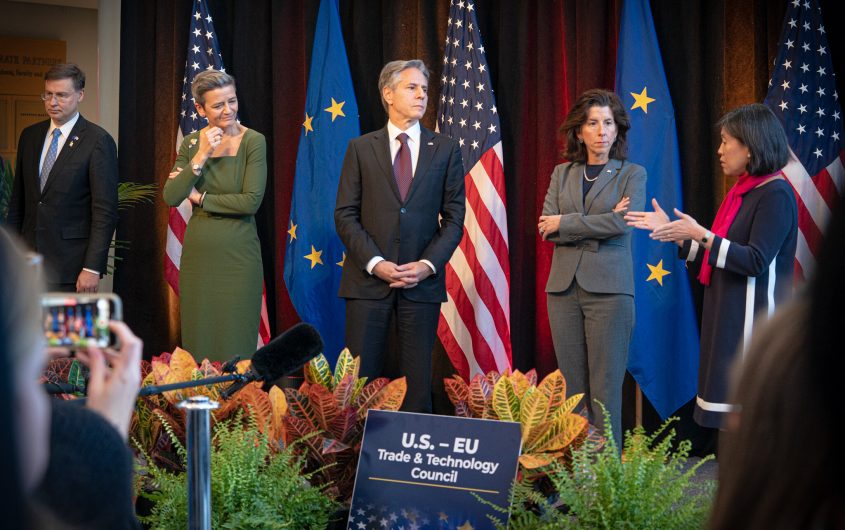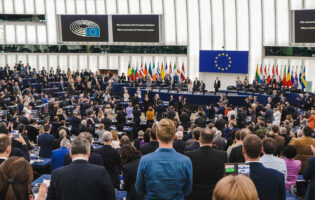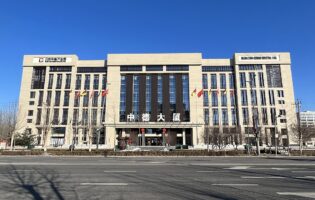
U.S. Department of State via Flickr
Compartmentalizing the Transatlantic Economic Relationship

Peter S. Rashish
Vice President; Director, Geoeconomics Program
Peter S. Rashish, who counts over 30 years of experience counseling corporations, think tanks, foundations, and international organizations on transatlantic trade and economic strategy, is Vice President and Director of the Geoeconomics Program at AICGS. He also writes The Wider Atlantic blog.
Mr. Rashish has served as Vice President for Europe and Eurasia at the U.S. Chamber of Commerce, where he spearheaded the Chamber’s advocacy ahead of the launch of the Transatlantic Trade and Investment Partnership. Previously, Mr. Rashish was a Senior Advisor for Europe at McLarty Associates, Executive Vice President of the European Institute, and a staff member and consultant at the International Energy Agency, the World Bank, UNCTAD, the Atlantic Council, the Bertelsmann Foundation, and the German Marshall Fund.
Mr. Rashish has testified before the House Financial Services Subcommittee on International Monetary Policy and Trade and the House Foreign Affairs Subcommittee on Europe and Eurasia and has advised three U.S. presidential campaigns. He has been a featured speaker at the Munich Security Conference, the Aspen Ideas Festival, and the Salzburg Global Seminar and is a member of the Board of Directors of the Jean Monnet Institute in Paris and a Senior Advisor to the European Policy Centre in Brussels. His commentaries have been published in The New York Times, the Financial Times, The Wall Street Journal, Foreign Policy, and The National Interest, and he has appeared on PBS, CNBC, CNN, and NPR.
He earned a BA from Harvard College and an MPhil in international relations from Oxford University. He speaks French, German, Italian, and Spanish.
What is the best way to judge the success of the third meeting of the U.S.-EU Trade and Technology Council (TTC) held on December 5th at the University of Maryland just outside Washington, DC?
One yardstick could be whether the TTC helped to resolve ongoing tensions between the United States and the European Union. At the top of that list would be the EU’s recent complaints about the U.S. Inflation Reduction Act (IRA) passed in August of this year. The $369 billion IRA includes tax credits available to U.S. consumers for the purchase of electric vehicles, but only if the cars pass certain local content and “Made in North America” (United States, Canada, Mexico) tests for parts and assembly.
But the United States could also point to the EU’s Digital Markets Act whose anti-trust rules would mostly impact U.S. platform companies since they are the world’s dominant providers or the data localization requirements in the EU’s emerging approach to cybersecurity certification for cloud services.
While it has been common for trade agreements to create dispute settlement arrangements to govern them after they come into force, rarely have the United States or the European Union insisted on placing the resolution of conflicts with their commercial partners at the center of the negotiation of such agreements.
This compartmentalization makes sense, as frictions are inevitably going to arise over time—especially between two large economies like the United States and the European Union. To insist that transatlantic relations need to become an economic Nirvana before the two sides can make progress on new areas of cooperation is a recipe for stalemate.
To insist that transatlantic relations need to become an economic Nirvana before the two sides can make progress on new areas of cooperation is a recipe for stalemate.
Instead, the right way to measure the outcome of the Trade and Technology Council’s third ministerial is to ask if it is likely to advance a global economy that is rules-based, equitable, and sustainable.
Why? China’s statist economic behavior has made commercial relations more unfair and more disorderly, while the inability of the World Trade Organization (WTO) to meet the challenges of climate change and digitalization has reduced the efficacy of its rules. But given the current impasse in the WTO, it is more informal efforts like the TTC that hold the greatest promise right now for preserving a high-standard global economy.
Specifically, this week’s meeting of the TTC demonstrated modest but useful progress on artificial intelligence, technical standards and conformity assessment, and climate.
On AI, the two sides point out in their joint statement that an approach that is risk-based and focused on trustworthy AI “supports common values, protects the rights and dignity of people, sustains the planet, and encourages market innovation.” The new roadmap for trustworthy AI announced by the TTC should help create a transatlantic first mover advantage in promoting global rules in this area.
In addition to agreeing to harmonize Megawatt Charging Systems for electric vehicles, the TTC also plans to step up the use of “mutual recognition agreements” of U.S. and EU procedures for assessing conformity with industrial standards. Beyond pharmaceuticals and marine equipment, the TTC will focus in the future on industrial machinery, which is important for the green transition.
Finally, the United States and the European Union agreed to launch a Transatlantic Initiative on Sustainable Trade to promote “our shared twin goals of a green and sustainable future and to increase transatlantic trade and investment.” This new effort would be most productive if it included not only bilateral cooperation but also the plurilateral Climate Club being advocated by German Chancellor Olaf Scholz within the G7 and a commitment to reforming WTO rules so they are more clearly supportive of climate action.









